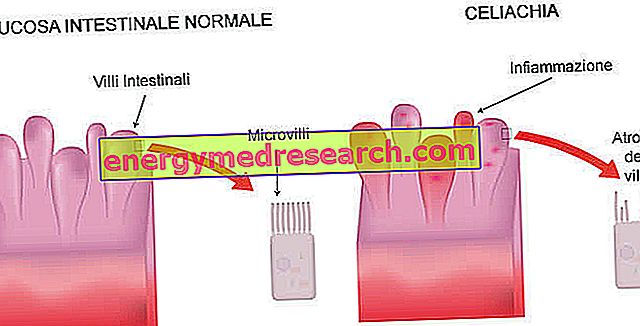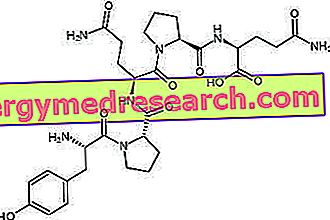Generality Platelets are fundamental elements for normal blood coagulation . Also called thrombocytes , platelets are derived from very large bone marrow cells (called megakaryocytes) and are released into the bloodstream. The determination of platelet parameters is prescribed as part of the blood count , which can be performed during a general check of the patient 's health status
Category blood analysis
Generality Gastric mucosa infection by Helicobacter pylori results in a systemic (IgM, IgG) and local (IgA) immune response . The antibody response to infection is greater the higher the bacterial load; consequently, it is possible to measure specific antibodies, in the patient's blood, to identify any colonization with Helicobacter pylori
Generality The plasma dosage of anti-endomysial autoantibodies (EMA) of IgA class represents one of the most reliable serological tests among those used in the diagnosis of celiac disease . These markers are characterized by particularly high specificity, close to 100% (99.8%), flanked by excellent sensitivity (93-96%); they are however burdened by the difficulty of standardizing the method, with possible interpretative errors especially in the presence of a low antibody titre or of poor operator diagnostic experience; moreover, the low availability of antigenic substrates significantly raises
Generality Neutrophil cytoplasmic antibodies (ANCA) are autoantibodies directed against antigens contained in the granulocyte cytoplasm. Their presence is a useful serological marker for the diagnosis and monitoring of some systemic autoimmune diseases; these include primary vasculitis (inflammation of the vessels), such as: Wegener's granulomatosis; Microscopic polyangiitis; Churg-Strauss syndrome
Generality The blood dosing of anti-gliadin antibodies (AGA) , introduced in clinical practice in the early 1980s, is a valuable aid in screening patients with suspected gluten-sensitive enteropathy ( celiac disease ). In recent years, the importance of anti-gliadin antibodies for the diagnosis of celiac disease has been reduced by the advent of serological markers endowed with greater sensitivity and specificity, such as anti-endomysial autoantibodies (EmA) and anti-transglutaminase autoantibodies (tTGA )
Generality In laboratory medicine, the abbreviation ANA - an acronym for Anti-nuclear antibody (trad. Anti-nucleus antibodies ) - identifies a vast and heterogeneous population of anomalous antibodies, directed against components of human cells, in particular nuclear (DNA, RNA, ribonucleoproteins, histones, centromere etc
Generality The carcino-embryonic antigen ( CEA ) is a protein that can be produced in large quantities by the cells of many forms of cancer : colorectal, thyroid, lung, breast, liver, pancreas, stomach and ovaries. Consequently, CEA is used as a marker for the initial typing of the neoplastic process and to monitor the occurrence of recurrences
Generality Haptoglobin is a transport glycoprotein, whose function is to irreversibly bind the free hemoglobin molecules circulating in the blood. This allows the formation of an haptoglobin-hemoglobin complex, which is rapidly removed from the bloodstream and directed to the liver for iron recovery
Generality The azotemia measures the amount of total non-protein nitrogen present in the blood. Much of this nitrogen is contained in the molecules of urea, a molecule harmless to our body, which derives from the organic transformation of ammonia. Urea is transformed in the liver and released into the bloodstream, to then be eliminated in the urine, after having been filtered by the kidneys
Generality Beta 2 microglobulin ( B2M ) is a protein whose plasmatic and / or urinary dosage provides useful information on renal function . The determination of the concentration of this parameter is important above all in the distinction of a tubular from glomerular nephropathy. The level of serum beta 2 microglobulin also increases in all conditions of increased cell turnover , such as inflammation, autoimmune disorders and infectious diseases
Diagnostic Utility In addition to the values of total cholesterol, LDL and HDL, the blood test reports can report the plasma concentrations of other less known cardiovascular risk markers. Among these, BNP and pro-BNP stand out, particularly useful for assessing the risk of heart failure (heart failure) and in general of left ventricular dysfunctions (such as cardiac ventricular hypertrophy). No










